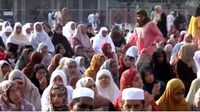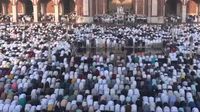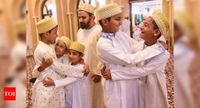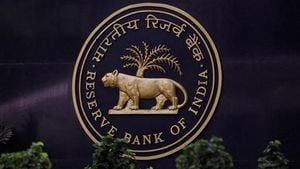As the crescent moon was sighted on Sunday evening, March 30, 2025, Muslims across India gathered in large numbers to celebrate Eid-ul-Fitr on Monday, March 31, marking the end of the holy month of Ramadan. The day commenced with congregational prayers known as Namaz held at various mosques across the country, including the iconic Jama Masjid in Delhi, where a massive crowd gathered to partake in the festivities.
In the early hours of the morning, worshippers flocked to the Jama Masjid, a historic site that has been a focal point for Eid celebrations in the capital for generations. Videos shared on social media showed the vibrant atmosphere as families and friends came together to offer their prayers and share in the joy of the occasion. Similar scenes unfolded at other mosques, including the Fatehpuri Mosque and the Juma Masjid Mahim Dargah in Mumbai, where devotees also gathered to mark the occasion.
In addition to the prayers, many communities organized special events to foster unity and inclusiveness. In Nagpur, for instance, the Dawoodi Bohra community celebrated Eid-ul-Fitr on Sunday with traditional customs, including Fajr prayers and a communal meal featuring kharak, a stuffed date delicacy. On Monday, members of the Muslim community were expected to congregate at Eidgah Ground, Jafar Nagar, for a special ‘Sadbhavana Eid Milan’ event, which was open to people of all faiths. This gathering aimed to promote harmony and goodwill among different communities.
"May this Eid bring lasting happiness and joy of cohabitation in the global society, across caste, religions, and regions," said Khwaja Sajid, a corporate trainer and life coach. He emphasized the importance of community and unity during this festive time.
As part of the Eid celebrations, it is customary for Muslims to give Zakat al-Fitr, a form of charity intended to ensure that the less fortunate can also partake in the festivities. Prominent community figure Shakeel Ahmed remarked, "The festival is incomplete without Zakat al-Fitr, a charitable donation given before the prayer to ensure that even the less fortunate can celebrate Eid with joy." This act of giving reflects the core values of compassion and generosity that underpin the significance of Eid.
In various parts of the country, the spirit of Eid was palpable. In Bhopal, over 10,000 people were expected to gather at the Eidgah for prayers, while in Coimbatore, worshippers filled the Islamiyah Matriculation Higher Secondary School to offer Namaz. The atmosphere was one of celebration, unity, and gratitude for the blessings received during Ramadan.
However, the celebrations were not without their challenges. In Bhopal, some attendees wore black arm bands as a form of protest against the Waqf Amendment Bill, highlighting ongoing concerns within the community. This juxtaposition of celebration and social activism added a layer of complexity to the day’s events.
Despite the protests, the essence of Eid remained focused on joy and togetherness. As families gathered to share meals, including traditional dishes like sheer khurma and biryani, the message of unity resonated throughout the celebrations. Community intellect Aftab Alam shared his hopes for the day, stating, "Eid teaches unity, compassion, and peace. May this Eid bring happiness, peace, prosperity, and harmony in our country."
The day also saw political figures participating in the celebrations. Bihar Chief Minister Nitish Kumar attended Eid festivities at Gandhi Maidan, while BJP leader Shahnawaz Hussain was seen offering prayers at a mosque in Delhi, showcasing the festival's ability to bring together individuals from various walks of life.
As the sun rose on March 31, the festive atmosphere filled the air, with families donning new clothes and exchanging greetings of "Eid Mubarak!" The festival, known as the ‘festival of breaking the fast,’ is a time for Muslims to celebrate the conclusion of Ramadan, a month marked by fasting, prayer, and reflection.
Eid-ul-Fitr has its historical roots dating back to 624 CE when Prophet Muhammad and his companions celebrated the first Eid after their victory in the Battle of Badr. This rich history adds depth to the celebration, reminding Muslims of the importance of faith, resilience, and community.
As the day progressed, numerous locations across India continued to witness gatherings for prayers, with the Indian stock market remaining closed in observance of the holiday. Banks, however, remained operational, except in a few states where local customs dictated otherwise.
In conclusion, Eid-ul-Fitr 2025 was celebrated with great fervor across India, reflecting the resilience and unity of the Muslim community. From solemn prayers to spirited communal meals, the day encapsulated the essence of togetherness, gratitude, and hope for the future. As families and friends came together, the spirit of Eid served as a reminder of the values of compassion and generosity that are central to the faith.






